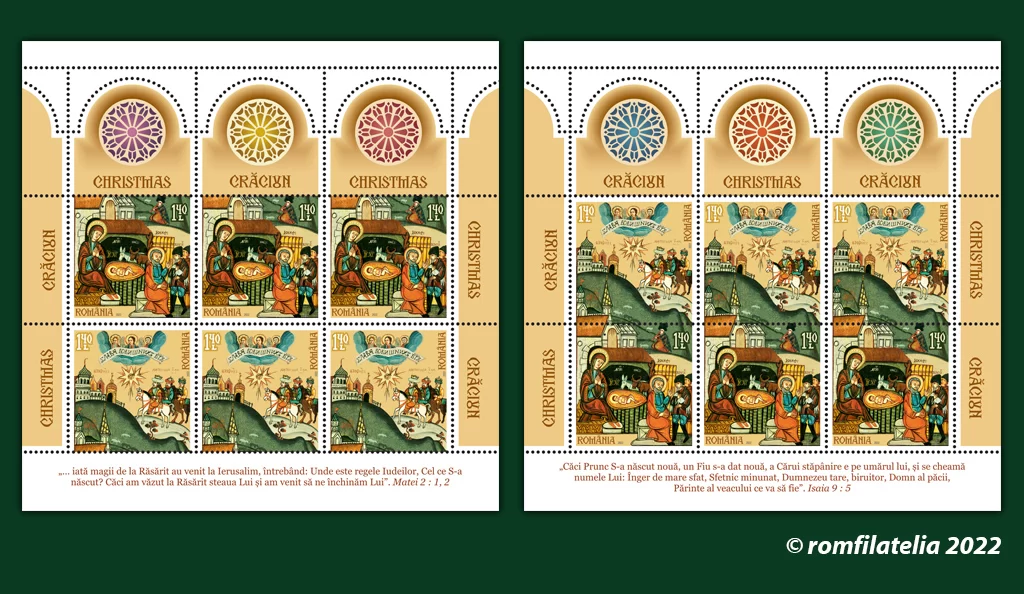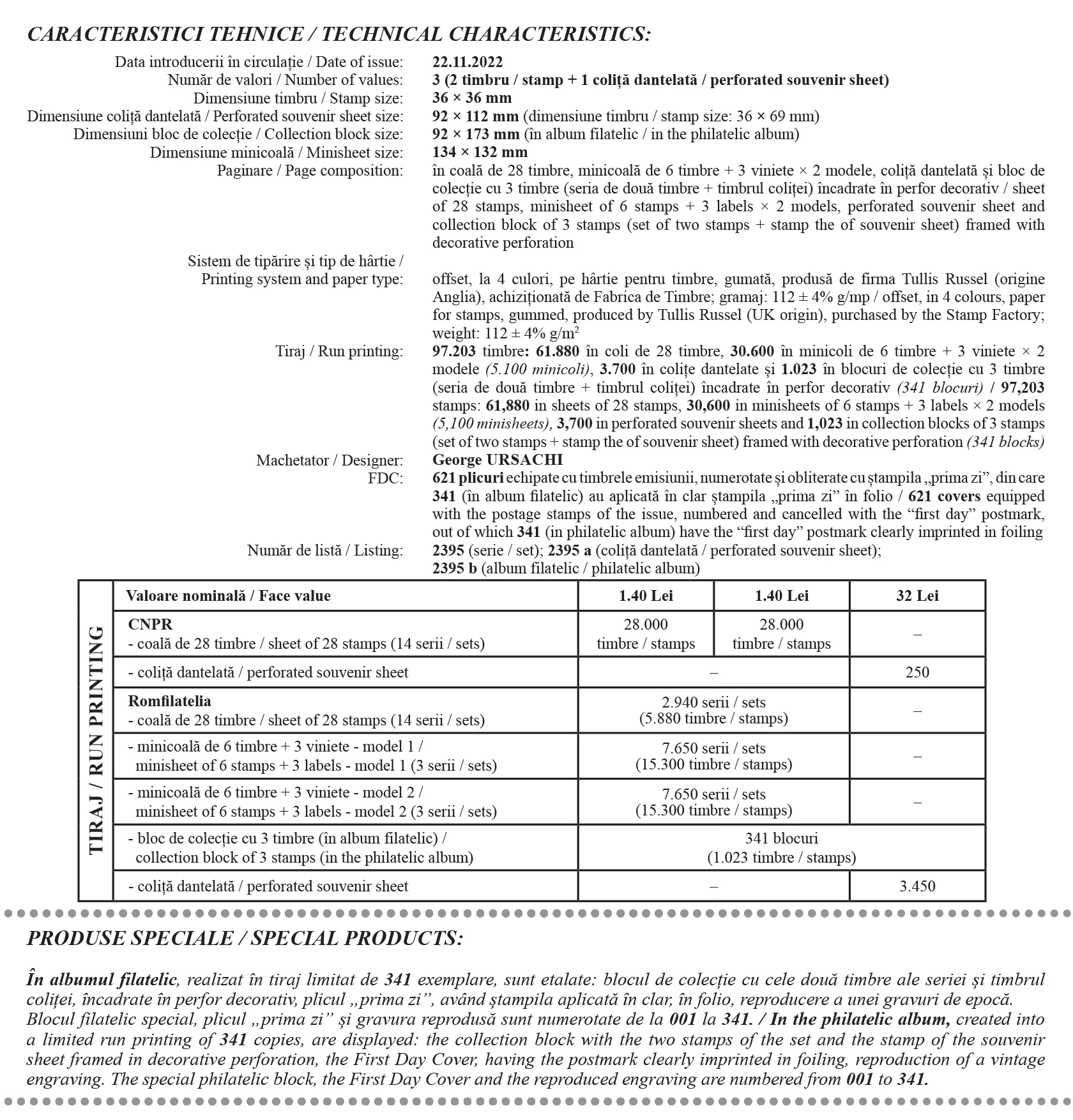 To celebrate the Nativity of Christ, Romfilatelia has prepared, like every year, the postage stamps issue with the theme “Christmas”, consisting of two stamps, a perforated souvenir sheet, a First Day Cover and a collection philatelic album.
To celebrate the Nativity of Christ, Romfilatelia has prepared, like every year, the postage stamps issue with the theme “Christmas”, consisting of two stamps, a perforated souvenir sheet, a First Day Cover and a collection philatelic album.
The issue “Christmas 2022” will be introduced into circulation on Tuesday, November 22nd, this year.
The celebration of the Nativity of the Lord, popularly called Christmas, brings us the news of the coming into the world of the Son of God made man, for our salvation. Christmas marks the Birth in Bethlehem of Judea of our Saviour Jesus Christ, the Eternal God. About this biblical event we learn details from the Holy Gospels according to Matthew and Luke, to which is added information that we find in the Tradition of the Church. To these two is added the historical certainty of the reality of the facts, found in the chronicle of the reigns of the Roman Emperor Octavian Augustus and the King of the Jews Herod the Great.
Christmas or the Nativity of the Saviour is a Christian holiday celebrated on December 25th, every year, being part of the 12 royal feasts of the Byzantine rite church.
The Christmas holiday is announced by the children’s custom of carolling and going with the Star, to herald the Nativity of the Lord. Also, an old tradition is that of going with the icon, a kind of carolling performed by the priests of the local community with the icon of the Nativity of the Lord, blessing the houses and Christians. The custom of carolling included not only song and ritual gesture, but also numerous messages and symbols of an ancient Romanian spirituality. It was preserved, being associated with the celebration of the great Christian event which is the Nativity of the Saviour Jesus Christ.
The postage stamp issue valorises images of icons belonging to the heritage of the Metropolis of Cluj, Maramureş and Sălaj.
The “Nativity of the Lord” icon in Osoi (anonymous painter, 17th century) is illustrated the two postage stamps, which, placed in a vertical plane, fully reproduce the image of an icon with the sizes of 36.5 × 72 cm, with multiple focal planes and a special depth made with skilful talent by the icon artist. The lower focal plane reproduces the scene of the Nativity, the Mother of God being seated on the left side, watching over the manger in which Baby Jesus is lying. Above the Saviour are rendered two animals, the ox and the donkey, symbols of the Israelites and the pagans, respectively. Joseph receives a gift (a lamb) brought by another man, apparently a shepherd, but which is explicitly nominated by the painter (by means of the inscription above) as being the Christmas character. He does not belong to the biblical register, but to that of tradition, added by the icon artist deliberately.
Looking up, the middle focal plane reveals the image of a shepherd besides his sheep, playing the whistle, reminding of the verse of the carol: “Angels sang, shepherds whistled, Magi worshipped, all rejoiced”.
The Magi, visible in the upper focal plane, guided by the star that announced the Nativity of the Saviour, head towards a distant target, the Citadel of Bethlehem, whose towers can be seen on the horizon.
The icon appears as a beautiful assembly, harmonized in a carefully chosen colour range.
The postage stamp of the souvenir sheet stamp block reproduces the image of the icon of the Mother of God with Child, also known as the “Mother of Mercy” currently exhibited in the Metropolitan Cathedral of Cluj-Napoca.
The icon, belonging to the Eleusa iconographic type, visibly illustrates the feeling of tenderness and affection between mother and child, the naturalness and vulnerability of the Child being signalled by the embrace of His Mother. The body of Jesus is in a slight inclination, at which point the cheeks of the child and the mother come closer, thus eliminating the rigidity of the traditional iconographic representation and evoking the very close relationship between the two characters. The role of the Mother’s right hand is that of a support point for the Child’s left hand, the faces being beautifully framed by the nimbuses made.
The Metropolitan Cathedral in Cluj-Napoca, built between 1923 and 1933, is one of the most representative Orthodox cathedrals in Romania, being the first large Romanian building erected in Transylvania after the Great Union of 1918.
Built in the neo-Byzantine style, with Romanian elements, the Cathedral dedicated to the “Assumption of the Mother of God”, nowadays a historical monument, is in the process of repainting of the interior using the mosaic technique, a project initiated by the worthy of remembrance Metropolitan Bartolomeu Anania in 2001.
Romfilatelia thanks His Eminence Father Andrei, the Archbishop of Vad, Feleac and Cluj and the Metropolitan of Cluj, Maramureș and Sălaj, for his episcopal blessing, as well as the designated representatives, for the documentary and photographic support given to the development of this postage stamps issue.









